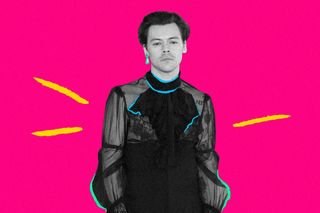
Why Accusing Harry Styles of Queerbaiting May Be Flawed
Queerbaiting describes an exploitative media tactic. When leveled against people, the criticism can gatekeep queerness.

Singer and actor Harry Styles addressed allegations of queerbaiting in Rolling Stone interview published yesterday. Styles, known for appearing in gender-fluid clothing in public, is notably set to star in a same-sex romantic drama later this year. Critics of Styles, presuming he is straight on account of his public relationships with women, accuse him of co-opting queer aesthetics for personal and artistic profit. The critique further goes that meanwhile, queer individuals continue to struggle to openly express their gender and sexual identities.
But there’s something off about accusing a person of queerbaiting based on how they express themselves publicly. When it comes to public figures, there’s little we know about them besides the information they share — with another, entirely private world also at play that strangers aren’t privy to. Leveling the accusation of queer-baiting against a person may then inadvertently force them to come out before expressing themselves the way they’d like.
A history of what the term means can help contextualize this. Queerbaiting is generally understood as writers’ and filmmakers’ suggestive use of homoerotic tension between straight characters in fiction, to bait queer audiences — starved of representation in mainstream storytelling — into consuming their art. This way, makers and writers hope to lure queer audiences into consuming their content without antagonising their straight fan following who constitute an overwhelming majority. In other words, it’s a form of media criticism that points out the deceptive use of queer subcultures to sell art.
All this, while queer representation in media, especially in popular entertainment, continues to be dismal. Earlier this year, filmmaker Taika Watiti, along with Natalie Portman promoted their film, the Marvel Cinematic Universe’s Thor: Love and Thunder, as a very gay film. However, upon watching the film, fans were left disappointed. Disney, Marvel’s parent company, is especially notorious for queerbaiting, while actually having very few characters on screen who are openly queer. Representation on screen can be an effective tool to normalize storytelling about marginalized communities. At the same time, luring marginalized audiences with a promise of representation is irresponsible, and continuing to do so even in the face of repeated criticism is just a message to marginalized communities that their voices and experiences do not matter.
Television isn’t exempt either. The suggestive sexual and romantic tension between Dr. John Watson and Sherlock Holmes in BBC’s Sherlock, and the makers teasing romantic undertones in the relationship between Dean Winchster and the angel Castiel in Supernatural, are among the most common examples of queerbaiting from the recent past. Most recently, Netflix’s Stranger Things was accused of queerbaiting in their treatment of the character Will.
Queerbaiting in media, then, is an exploitative strategy to earn more viewership and fan following without actually committing to true representation and space-sharing either in the narrative of a show or behind the scenes, and thus deserves to be called out. However, accusing specific individuals of queerbaiting in their appearances or even work they have done in a mostly individual capacity may miss the point of the critique, and can also have graver consequences.
In 2018, Rita Ora released a music video of her song Girls, which also featured Bebe Rexha, Cardi B, Charli XCX. The lyrics and video of Girls was coded in sapphic language, with the refrain going “sometimes I just wanna kiss girls.” Fans and openly queer artists slammed Ora and her collaborators saying the song was inaccurate in its depiction of same-sex relationships and it did more harm than good for the queer community. In the aftermath of this backlash, Ora was forced to come out as bisexual, and admit to having had romantic relationships with both men and women, while apologizing for hurting sentiments.
Related on The Swaddle:
When Fed‑Up Straight Women Wish They Could Date Women, They’re Unconsciously Being Bad Allies
The case of Girls exemplifies one pitfall of accusing specific individuals of queerbaiting. Necessitating a queer individual to come out publicly to defend their work just because it doesn’t meet a specific standard of queerness is both ironic and antithetical to the queer movement.
When someone is accused, in their individual capacity, of queerbaiting, either for the way they carry themselves in public or because of their sexual relationships, it inadvertently creates a certain standard of queerness that one needs to maintain to pass as queer. In other words, it gatekeeps what it means to be queer, and also what expressing it would look like.
Instances of expecting queer individuals to maintain a certain standard of queerness can also result in the erasure or phobia of sexualities and gender identities that see themselves as queer but are not acknowledged as truly queer by other individuals because they do not meet certain requirements. People who are asexual, bisexual, transgender, or fall anywhere else under the queer umbrella are frequently either villainized or invisibilized because they are not deemed by others to be “queer enough.” Importantly, then, the idea of individuals queerbaiting can be detrimental to their self-determination.
This does not of course excuse someone like Harry Styles from complete scrutiny, though. When Styles appeared in a Gucci dress on the cover of Vogue — the first man to appear on it — in December 2020, Billy Porter, a black gay man known for his genderfluid fashion choices, criticized Styles for having it easy as a popular white man. This is valid criticism — even though Porter and several other openly queer people have struggled to freely express their sexuality and fashion for ages, it was Harry Styles whom Vogue chose to represent as the face of the queer movement. But this is still not queer-baiting; it’s a case of Styles’ white privilege allowing him to profit over others who arguably deserve to be there first.
While one should rightfully hold accountable artists and media exploiting queer narratives without actually extending representation or profits to queer communities, accusing individuals of queerbaiting can create expectations of a certain amount of queerness that public individuals must follow for passing as queer. It creates an invisible test for their queerness and goes on to only strengthen certain narratives and stereotypes of what is queer and what is not.
Amlan Sarkar is a staff writer at TheSwaddle. He writes about the intersection between pop culture and politics. You can reach him on Instagram @amlansarkr.
Related


The ‘Quiet Quitting’ Trend Has a Branding Problem
